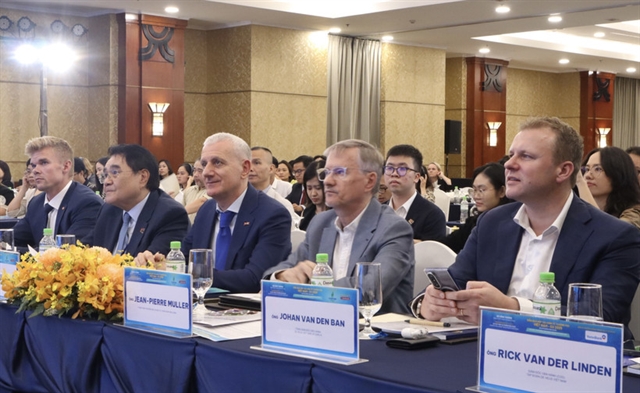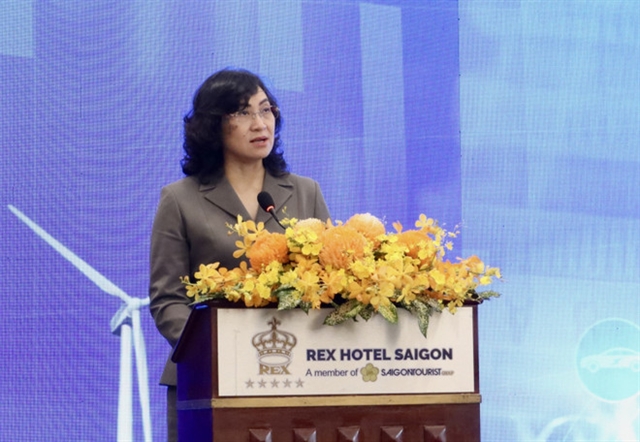
Participants in the Vietnam–EU Economic and Trade Cooperation Forum 2025 in HCM City on Friday. — VNA/VNS Photo
HCM CITY — Although the EU-Việt Nam Free Trade Agreement (EVFTA) has elevated the economic and trade relations between the two sides to new heights, there remains vast potential for further development, requiring joint efforts from management agencies and business communities, heard a forum held in HCM City on Friday.
At the Vietnam – EU Economic and Trade Cooperation Forum 2025, jointly organised by the Vietnamese Ministry of Industry and Trade (MoIT), the embassies of the EU member states, and the European Chamber of Commerce in Việt Nam (EuroCham), Deputy Minister of Industry and Trade Phan Thị Thắng said that five years after the EVFTA took effect, the Việt Nam – EU trade cooperation has maintained positive growth momentum and shown encouraging shifts, despite global economic headwinds.
According to data from Vietnam Customs, two-way trade has steadily increased, from nearly US$49 billion before the EVFTA came into force to nearly $78 billion in its fifth year, or an annual growth rate of over 10 per cent. Việt Nam’s exports to the EU rose by an average of 11.7 per cent per year, while imports from the bloc grew 6.1 per cent annually.
The EU is now Việt Nam’s leading trading partner, ranking as the third-largest export market and fifth-largest import market. Conversely, Việt Nam is the EU’s largest trading partner within ASEAN and ranks among the top 10 suppliers of goods to the EU market.
Thắng affirmed that EVFTA not only promotes trade and diversify the market but also creates drivers for economic restructuring, institutional reform, and better investment environment.
The agreement, she added, has opened new avenues for cooperation in priority areas such as green economy, digital economy, energy transition, and sustainable development, aligning with both the EU’s focuses and Việt Nam’s socio-economic development goals.

Deputy Minister of Industry and Trade Phan Thị Thắng speaks at the forum. — VNA/VNS Photo
She noted that Việt Nam needs to remain agile and adaptable to fully capitalise on these opportunities amidst global uncertainties, adding the country, with a highly open economy, needs to actively integrate deeper into global value chains to strengthen its position.
EuroCham Vice Chairman Jean-Jacques Bouflet said the EU sees Việt Nam as a key partner that offers significant advantages in trade diversification, investment expansion and flexible supply chain. Việt Nam, he said, is increasingly recognised as a regional hub for sustainable manufacturing and investment, thanks to its young and dynamic workforce, progressive reforms, and strong commitment to innovation and sustainability.
EuroCham’s survey revealed that 76 per cent of EU business leaders see Việt Nam as an attractive investment destination. Moreover, 80 per cent of European firms in Việt Nam expressed optimism about strong growth prospects over the next five years. These factors form a solid foundation for long-term prosperity and deeper partnership between Việt Nam and the EU, according to Bouflet.
However, he acknowledged that significant challenges remain, with many EuroCham member companies reported that complex administrative procedures remain a major barrier, causing delays, generating costs and affecting operational efficiency.
EuroCham recognises and appreciates the Vietnamese Government’s strong reform efforts in recent times, particularly the elimination of overlapping procedures, regulatory relaxation, and promotion of a more dynamic and transparent business environment.
As a long-standing partner in Việt Nam’s agricultural development, CEO of De Vietnam and Asia Johan Van Den Ban highlighted the rising consumer demand for product transparency, ethical sourcing and environmental responsibility.
Across Asia, food safety, animal welfare, and environmental protection are becoming key priorities. Meanwhile, European partners are adapting their procurement strategies to comply with ESG standards and new EU regulations such as the Carbon Border Adjustment Mechanism (CBAM) and the EU Deforestation Regulation (EUDR).
Against the backdrop, he pointed out that enterprises failing to adapt quickly to the green and sustainable trend risk losing their position in the global value chain, suggesting strategic coordination between the Government and businesses and international partners to promote green transition. — VNA/VNS